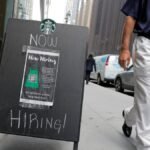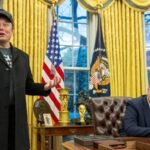President Donald Trump has begun slashing equal opportunity programs through two executive orders on his first day in the White House. Through them, it has also repealed the 60-year-old executive order that originally implemented equality and diversity programs in the United States.
Here’s more on how Trump is dismantling federal Diversity, Equity and Inclusion (DEI) programs, which he has called “radical,” “illegal” and “discriminatory.”
What are these orders about?
Two of the 26 executive orders Trump signed Monday are related: one calling for the end of federal DEI programs and another calling for federal jobs reform.
Ending federal DEI programs
In an executive order, titled Ending Radical and Wasteful Government DEI Programs and Priorities, Trump declared that the Joe Biden administration “forced illegal and immoral discriminatory programs.”
DEI, also known as DEIA (Diversity, Equity, Inclusion and Access), refers to initiatives and frameworks within organizations that seek to make themselves more inclusive and address discrimination against historically disadvantaged communities. Stop the
DEI’s core values include:
- Diversity: Acceptance of people from different backgrounds
- Equity: Fair and equal treatment of all people regardless of background
- Inclusion: Ensuring that minorities are not underrepresented or left behind because of their identity.
The executive order states that the Director of the Office of Management and Budget (OMB), with assistance from the Attorney General and the Director of the Office of Personnel Management (OPM), will now work to eliminate DEI programs operating within the federal government. .
To this end, federal employment practices, union contracts and training policies or programs will be regularly reviewed.
Reforming the Federal Recruitment Process
Trump signed another executive order on Monday, titled Reforming the Federal Hiring Process and Restoring Merit in the Civil Service. It says current federal hiring practices are flawed and no longer focus on merit or “dedication to our Constitution.”
The order requires federal agency leaders to develop a federal employment plan, modify the way federal employees are hired or be fired, within 120 days of the order’s political considerations. Emphasize decisions based on merit. The order added that the federal recruitment plan would “prevent individuals from being recruited on the basis of their race, sex or religion”.
What about the private sector?
As for the private sector, Trump also issued a separate one on Tuesday. Presidential Proceedings — rather than an executive order — entitled Ending Unlawful Discrimination and Restoring Merit-Based Opportunities.
It mentions “encouraging the private sector to eliminate illegal DEI discrimination and preferences” and directs all federal agencies to identify each of the nine publicly traded companies or other entities. which may be subject to civil investigation.
The action also said the agencies would have to “investigate” private companies, not-for-profit organizations and associations, as well as large foundations and colleges valued at more than $1bn, that are adopting DEI practices.
What is the 1965 Equal Employment Opportunity Act that Trump is repealing?
Trump’s executive order on DEI programs states that “Executive Order 11246 (Equal Employment Opportunity) of September 24, 1965 is repealed.”
Equal Employment Opportunity Order (PDF) was signed by Democrat President Lyndon B. Johnson from 1963 to 1969. It prohibited federal contractors from discriminating in employment decisions based on race, color, religion, sex, or national origin.
It also called for affirmative action, a policy to support historically disadvantaged individuals for workplace opportunities. The concept of affirmative action was first introduced in 1961 by Democrat President John F. Kennedy. Johnson’s 1965 executive order was opposed by segregationists and Republicans who believed in racial segregation.
The executive order was signed to prevent employment discrimination against women and minorities. It came amid the boom Civil Rights Movement In the United States, it marked the emergence of identity politics in the country after a series of mass protests and civil disobedience over discrimination against black people and women.
In 1964, a year before Executive Order 11246, Johnson signed the Civil Rights Act, which also banned discrimination based on race, color, religion, sex, or national origin. In 1965, African Americans were finally granted the right to vote through the Voting Rights Act.
Who are DEI workers?
Federal DEI staff are professionals such as trainers in diversity offices. According to the American Federation of Government Employees (AFGE), it is unclear how many federal employees DEI has in total, the BBC reported. AFGE is a union representing 800,000 federal and Washington, D.C. government workers in the United States and around the world.
Many businesses and other organizations stepped up recruitment of DEI employees after George Floyd, a black man, was killed by a white police officer on a street in Minneapolis, Minnesota in May 2020. That was because “companies sought to articulate their commitment to diversity and inclusion,” according to an article published on the website of Diversity Resources, a Colorado-based human resources organization.
The White House has now said that all federal DEI employees will be placed on paid administrative leave by 5 p.m. (22:00 GMT) Wednesday. By then, all DEI-centric web pages will also be offline. Currently, DEI-focused pages on several federal websites are now offline, displaying error messages.
How do Americans feel about DEI?
A survey conducted by the Pew Research Center in February 2023 found that 56 percent of American workers surveyed believe that focusing on DEI at work is a good thing. Sixteen percent thought it was a bad thing and 28 percent of respondents were neutral.
“Eliminating these programs would be an opportunity for President Trump to undermine the merit-based civil service and test federal hiring and firing decisions for loyalty,” said a press release issued Tuesday by the federal workers’ union AFGE. There is another way to change.”
“Programs that promote an inclusive workforce ensure that laws apply equally to all, and they help build a federal government that looks like the diverse population it serves. is.”
However, opposition to DEI programs is growing in the US, particularly among conservatives. The Pew survey was conducted at a time when leading companies were laying off their DEI employees, a sign that organizations are also beginning to reject such schemes.
According to a report published by New York-based workforce database Revelio Labs, as of November 2021, DEI roles were leaving companies nearly twice as fast as non-DEI roles.
Between July and December 2022, Amazon, Applebee’s and X, then called Twitter, had the largest exodus of DEI workers.
In June 2023, the US Supreme Court outlawed affirmative action for college applications, concluding that admissions based on race violated the Equal Protection Clause of the US Constitution. The nonprofit legal advocacy organization Students for Fair Admissions (SFFA) filed a lawsuit alleging that Harvard College and the University of North Carolina violated the 14th Amendment to the U.S. Constitution as well as the Civil Rights Act of 1964 because They were discriminated against in the admission process. Asian American students. SFFA was founded in 2014 by conservative legal activist Edward Blum.
Subsequently, many companies, including McDonald’s, Walmart, Ford, Lowe’s, John Deere and Tractor Supply, also withdrew their DEI programs.
On January 3, 2024, tech billionaire Elon Musk, who Trump has chosen to lead his Department of Government Efficiency (DOGE), posted on X: “DEI is just another word for racism. Whatever. Shame on him who uses it.”












































